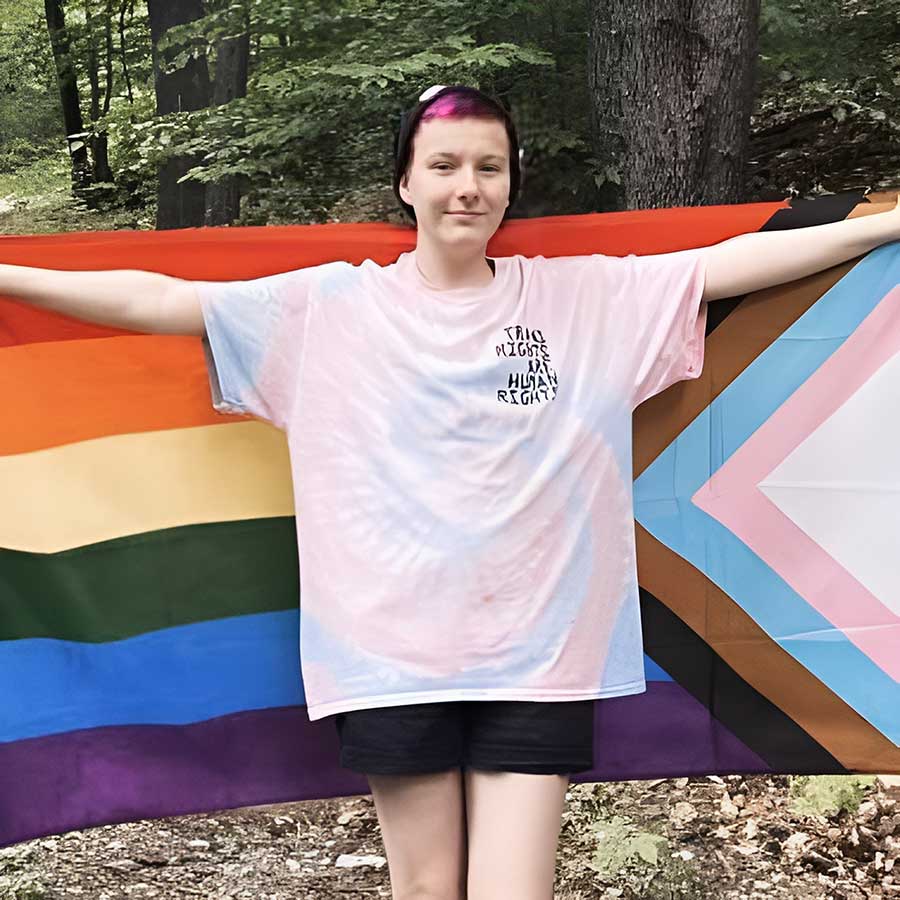Sustaining a safe place
The NVUnity club was brought back to the Johnson campus in 2020 by Emerson Bemis after a short disappearance following the graduation of previous club members. Bemis is the current NVUnity club president and struggled to find other members of the LGBTQ+ community during his first year. Because of this, he wanted to create a club which would allow him and other members of the LGBTQ+ community to connect in a place where all their voices would be heard.
It is for very similar reasons that other members have joined the club. “I joined [the club] because I am part of the LGBTQ+ community and I have friends and family who are also a part of it,” says Alexia Murray. “I like knowing that I have people who have had similar experiences . . . and I won’t be judged [by them].”
According to Bemis, members of the club are representative of the student body as a whole. “It’s not all just one identity; I don’t think any of us . . . have the same identity completely – every letter of the LGBTQ+ community [is part of the club],” said Bemis, who makes it a point to welcome everyone to the club – whether they are part of the LGBTQ+ community or not.
This allows club members to learn how best to support many different people, no matter how they identify.
“The goal of NVUnity is just to make a safe place on campus where people can feel like they can have their voices heard,” said Bemis. Other club members agree on this point, but have also found that the club serves another purpose. “The purpose of the club is to have a safe place for queer people to go to and feel accepted, as well as [to] teach and help other people learn more about the community, their struggles, and how to help them,” said Murray.
While meetings are a primary method of reaching this goal because they allow students to share their voices, there are also several other ways in which members are trying to meet this goal.
For example, they are working on getting a permanent meeting room and holding events to entertain and educate the campus community. Club members agree that these methods are allowing the club to meet its goal, and Murray also believes “that when we get further into the school year, [NVUnity] will continue to grow.”
It is important to Bemis that Johnson students – especially LGBTQ+ students – are able to find any help that they may need. First and foremost, Bemis has and will continue to offer himself as a resource to assist with research and to be a support for students if they are feeling alone or out of place. He noted he is also prepared to help students reach out if they need help that is beyond his abilities. He is, however, also working on getting informational brochures and other resources to keep in the room that he is working on obtaining.
Club members had several suggestions for tactics that non-members can use to help LGBTQ+ community members feel safe and welcome on campus. Bemis said that when students include their own pronouns in an introduction – even when they aren’t asked to – it can make LGBTQ+ students feel more comfortable when sharing their own pronouns, rather than feeling as though they are outing themselves when they do so.
Club member DJ Jones’s suggestion to make LGBTQ+ community members feel comfortable was to “think before you speak . . . and be open to conversations if you mess up.” Other club members shared a similar sentiment. “Keep an open mind and don’t judge people,” says Murray. “Educate yourself on how to help and if you’re unsure, ask . . . we are people as well, and we deserve to be treated like it.”
The name of the club – NVUnity – will change after the Vermont State University merger is complete. Bemis is excited to give club members a more involved role in this process and plans to take suggestions from club members for both the new name and new logo, then take votes to choose both.



